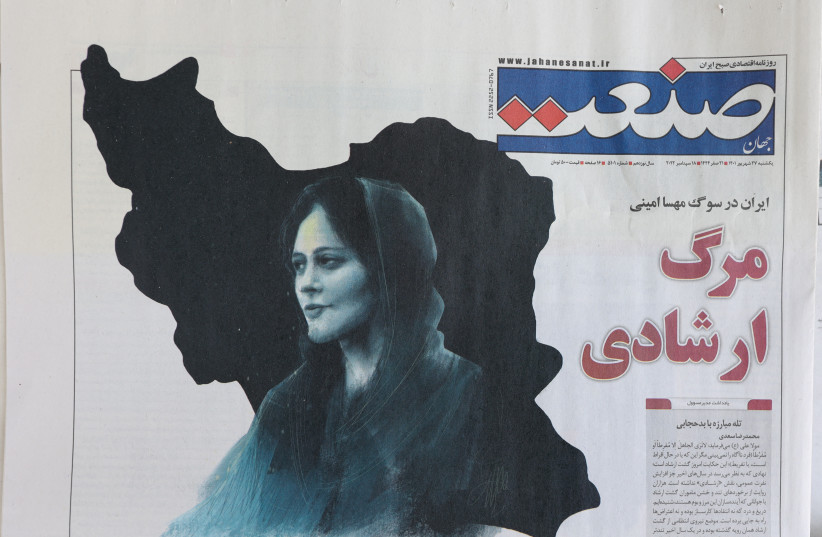Iranian police confirm ‘morality patrols’ back on the streets
Iran’s police force announced Sunday that it would be returning “morality police” patrols to the streets in order to enforce hijab laws, after about half a year in which the operations of the force were replaced with cameras and other technological measures.
“Starting from today, with the establishment of car and foot patrols throughout the country, while carrying out numerous police missions, we will inevitably deal with those who, unfortunately, regardless of the consequences of dressing outside of the norm, still insist on breaking the norm, while warning and reminding them that in case of non-compliance with the police’s orders, legal action will be taken and they will be introduced to the judicial system,” said police spokesperson Saeed Montazeral-Mahdi in statements published by Iranian media.
He said that the decision was made in light of “the demands of the people and the request of various social groups and institutions, as well as the emphasis of the honorable presidency and the judiciary within the framework of the law.” The decision was also made in order to “expand public security and strengthen the foundation of the family.”
According to Radio Farda, Iranian citizens have been reporting an increase in vans carrying “morality police” officers on the streets of the country.
Also known as the Guidance Patrol, it was founded in 2005 under the administration of then-president Mahmoud Ahmadinijad and served as a religious police, reporting directly to Supreme Leader Ali Khamenei.
 A newspaper with a cover picture of Mahsa Amini, a woman who died after being arrested by the Islamic republic’s ”morality police” is seen in Tehran, Iran, September 18, 2022. (credit: MAJID ASGARIPOUR/WANA (WEST ASIA NEWS AGENCY) VIA REUTERS)
A newspaper with a cover picture of Mahsa Amini, a woman who died after being arrested by the Islamic republic’s ”morality police” is seen in Tehran, Iran, September 18, 2022. (credit: MAJID ASGARIPOUR/WANA (WEST ASIA NEWS AGENCY) VIA REUTERS)The typical unit consists of a van with a mixed male and female crew that patrols or waits at busy public spaces to police behavior and dress considered to be improper.
Parliamentarian says move wasn’t coordinated with parliament
The head of the Iranian Parliament’s Social Commission, Vali Esmaili, rejected the police’s announcement on Sunday, telling the Iranian Student News Network that “it seems unlikely that there has been any coordination or agreement with the parliament to restart moral security patrols.”
Esmaili stressed that when attempting to influence cultural and social actions, measures should be taken in an “appropriate” manner and “in line with the same cultural environment.”
“Outside of this path, if we choose another path, we will definitely not get an ideal answer and it can only have a temporary effect,” said Esmaili, noting that the Iranian parliament is promoting a bill on hijab. The bill would increase legal penalties against women caught not wearing it.
Morality police’s operations scaled back after nationwide protests
THE “MORALITY POLICE” became the center of tensions in Iran last September, after Mahsa Amini was killed while in the custody of the unit after being arrested for allegedly wearing hijab improperly. Amini’s death sparked nationwide protests that swept Iran for months.
At the end of December and early January, the rate of protests began to decline, with only sporadic footage of protests published throughout January and February. Protests have periodically renewed in a number of locations in the months since then after a number of arrested protesters were executed and after Amini’s grave was vandalized.
In recent months, Iranian officials had announced that cameras would be used in public places to identify women who were not wearing hijab in accordance with Iranian law. Women caught would be sent a warning text. If they were caught again, they would be summoned for a hearing. Women caught not wearing hijab in their vehicles after receiving a warning would have their vehicles impounded.
Montazeral-Mahdi told IRNA in April that within 24 hours of when the new plan was implemented, several hundred cases of women not wearing hijab in cars were recorded by police and the owners of the vehicles were warned via SMS. About 84% of those who received warnings complied, according to the spokesperson.
Additionally, some 3,500 text messages were sent to businesses warning them to comply with hijab rules, with 532 businesses pledging to enforce them. Hundreds of businesses have been shuttered on charges of allowing in women who were not wearing hijab.
Arrests of women caught not wearing hijab, as well as arrests of both men and women who have expressed opposition to hijab laws, have continued throughout recent months.
On Sunday, Iranian officials announced that actor Mohammad Sadeghi had been arrested after releasing a video objecting to the arrest of women for allegedly violating hijab restrictions. The Iranian Fars News Agency stated that Sadeghi used “female make-up” and “promoted homosexuality” as well.





Comments are closed.